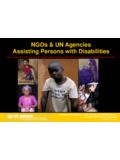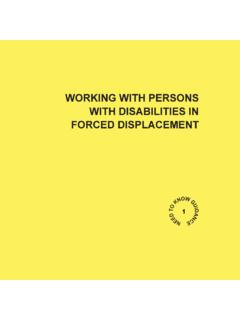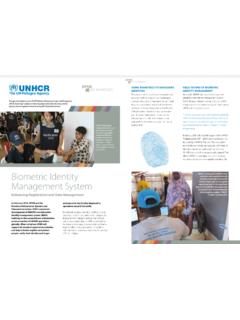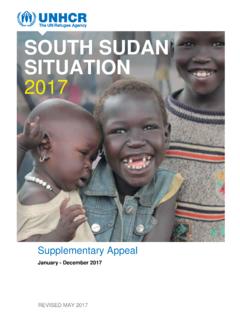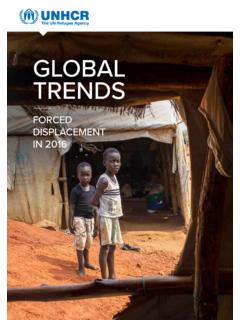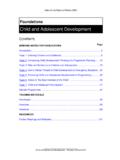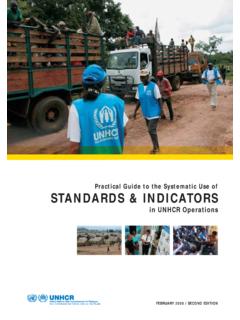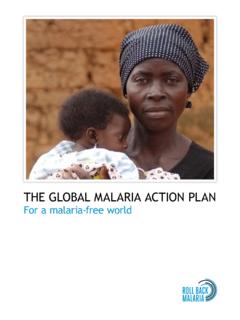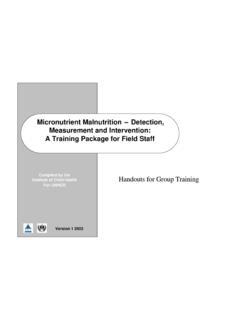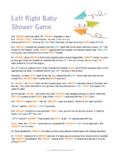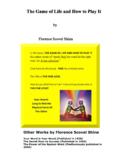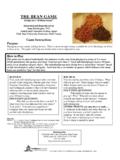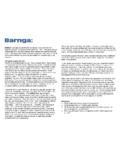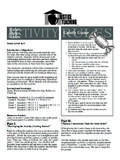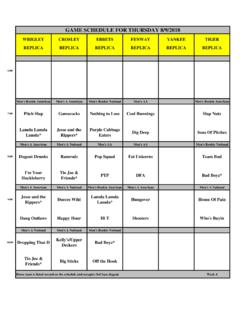Transcription of Passages - UNHCR
1 United Nations High Commissioner for RefugeesPassagesAn awareness gameconfrontingthe plight of refugees2 Passages Passages Passages Passages PassagesUNHCR s new educational toolA simulation game designed to create a better understandingof the problems of refugeesTHE REFUGEE TRAGEDYAs long as there have been wars, persecution, discrimination and intolerance, there have beenrefugees. They are of every race and religion and can be found in every part of the world. Forcedto flee out of fear for their lives and liberty, they have often left everything behind, experiencedterrible suffering and been separated from their families. In refugee camps they will find safe-ty, but the living conditions are grim. In their asylum country, refugees are often victims of xe-nophobia. If, after years of exile, they are finally able to return home, their return is often toa country shattered by UNITED NATIONS HIGH COMMISSIONER FOR REFUGEESThe United Nations High Commissioner for Refugees is a nonpolitical, humanitarianagency devoted to protecting and assisting the world s refugees.
2 Currently, the UNHCR is help-ing over 27 million people who have sought refuge from persecution or armed conflict, or whoare trying to return home. The first priority of UNHCR is to protect these people. Today, xeno-phobic tendencies threaten the centuries-old tradition of granting asylum. As a result, protect-ing refugees also involves explaining to the public exactly who refugees are and what they havebeen through. It is essential that people understand that refugees are not a threat to them, but arethemselves AWARENESS AMONG YOUNG PEOPLEAn essential aspect of our efforts to create public awareness is the promotion of refugee is-sues among young people. For several years, and in many countries, we have been working withteachers and youth organizations to develop materials such as posters, educational kits, bro-chures and videos aimed at improving general understanding of the refugee A GAME?
3 games are one of the best methods to help people understand phenomena which are complexand far removed from their everyday lives. A game allows participants to experience emotionsin a very personal and enduring manner, but on a smaller scale than in real A SIMULATION GAME?A simulation game works through the creation of a simplified but dynamic scale model ofreality. It is an effective way of allowing people to live and feel a remote situation. This partic-ular game is designed to help create awareness, arouse emotions and encourage participants totake action on behalf of refugees. A simulation game is better than a full-scale reenactmentwhich could be too brutal and have traumatizing effects on certain young some ofwhom may be refugees DOES Passages INVOLVE?By playing the game Passages , participants discover the concrete problems which confront feel the psychological anguish caused by separation and see what forces people into refugee situations and the train of events that brings them to ref-ugee camps and think about possible solutions to refugee problems, particularly with regards to integrationwithin the country of asylum and repatriation to the country of adopt a more welcoming attitude towards refugees in their own become motivated to undertake actions on behalf of refugees.
4 Passages can be played in various situations:- with young people of different ages and ethnic backgrounds;- with groups of different sizes;- with schools groups, youth organizations, community groups, etc.;- both indoors and hope you will find Passages to be an effective educational by Chantal Barth l my-Ruiz, Beno t Carpier and Nadia Cl ment (Argine consultants-Paris)for the United Nations High Commissioner for Refugees 19954 PassagesPassagesPassagesPassagesPassages An Awareness Game Confronting the Plight of RefugeesTABLE OF CONTENTS Part I. Game Leader's Dossierp. 5- Preparation for the Game Leaderp. 61. Personal Experiencep. 62. Documentationp. 83. Overview of the Gamep. 84. Group Organizationp. 105. Space Managementp. 106. Duration of the Gamep. 117. How to be a Game Leaderp.
5 118. Summary of Documents Used by the Game Leaderp. 14- Necessary Materialsp. 15- Overall Game Plan Memop. 17- Game Leader's Family Summaryp. 20 Part II. Game Modulesp. 21- Family Set-up (Game Module # 1)p. 22- Escape and Separation (Game Module # 2)p. 24- Emergency Supply Case (Game Module # 3)p. 26- Temporary Shelter (Game Module # 4)p. 27- Deciding to Leave your Country (Game Module # 5)p. 29- Border Crossing (Game Module # 6)p. 30- Setting Up Camp (Game Module # 7)p. 32- The Family Spokesman (Game Module # 8)p. 34. Password Codesp. 35- Meeting the Local Population (Game Module # 9)p. 36- Repatriation (Game Module # 10)p. 38- Final Debriefingp. 40- Farewell Gamep. 42 Attachments: Player Documents. Family Game Sheet. Family Data Sheets. Cards. Event Cards (Game 3).
6 Emergency Supply Case - Player Guidelines (Game 3). Event Cards zzzzz (Game 4). Event Cards (Game 5). Event Cards (Game 6). Identification Form (Game 6). Lists of Available Supplies (Game 7). The Family Spokesman - Player Guidelines (Game 8). Password Cards PPPPP (Game 8). Item Cards (Game10). How do you feel now? sheet (Final Debriefing)5 Part IPart IPart IPart IPart IGame Leader'sGame Leader'sGame Leader'sGame Leader'sGame Leader'sDossierDossierDossierDossierDoss ier6 GAME LEADER'S DOSSIERThe purpose of this game is to create awareness of the difficulties experienced by refugees as theyflee their homes and countries towards an uncertain is essential that you, as the game leader, have some prior knowledge of these difficulties andthe emotions they provoke.
7 As a first step in your preparation, therefore, we propose that you gothrough some short experiments, in order to give you personal experience. As a second step,we have provided you with a few suggested readings. Finally, you will be guided through thedifferent elements of the game, including how to be a game leader and how to prepare thenecessary for the Game Leader1. Personal ExperienceThis step should be completed at least one day in The notion of time Sit down in a place where you will not be disturbed and blindfold yourself. Stay there for 5 minutes; do not count or use any artificial means of telling time. Use your ownjudgement and intuition. Take off the blindfold and check your watch. Think about how you felt with the blindfold on and write it down.
8 How does it feel to sit in thedark, with no way to measure time and nothing to do but wait?The point of this exercise: A refugee may have to spend several hours hidden in darkness, afraidof being discovered and killed. Unlike you, who have undergone this experience voluntarily, he/she is terrorized by a situation that has been forced on Taking orders Imagine that you are deprived of your autonomy. In other words, you are no longer allowed tomake decisions for yourself. Your right to come and go, and to take care of your most basic needs,are all subject to someone else s authorization (standing up, walking, going to the toilet, drinking,eating, talking, etc.). Try to feel what it might be like to be restricted in this way. Imagine how you would react. Notonly has your freedom been taken away but people are constantly giving you orders, making youwork, pushing you around, interrupting you.
9 And no one listens to point of this exercise: To help you understand the stress that a refugee feels during his or herflight and to make you aware of the stress that your actions and attitudes may provoke among theplayers during the simulation Shackled Having to obey orders all the time is like being shackled. You are forced to do things withoutknowing why. Walk around for 2 or 3 minutes holding your right ear with your left hand and yourleft ankle with your right hand. How does it feel to be forced to do this?The point of this exercise: Think about what you have just experienced for these few live under this kind of constraint for hours, months, even Loss Find a quiet and comfortable place to sit. Equip yourself with a pen and paper. Try to remember a situation when you experienced a feeling of loss.
10 Perhaps it was a cherishedobject, a place you loved to visit, a favorite pet or a loved one .. Let all the memories and emotions associated with the loss come back to you. Write them down,so that later you can reread what you were feeling and evaluate the importance of these personalexperiences. Think over your own experience of loss and consider how it must feel to be deprived of all thosethings or people to which or to whom you attach great point of this exercise: Many refugees lose absolutely everything: their country, their home,their friends, their family. Try to understand the pain they must DocumentationWe suggest you consult publications distributed by the United Nations High Commissioner forRefugees, particularly the brochure Refugee Children where you will find personal accountsof refugee children and the magazine called Refugees.

